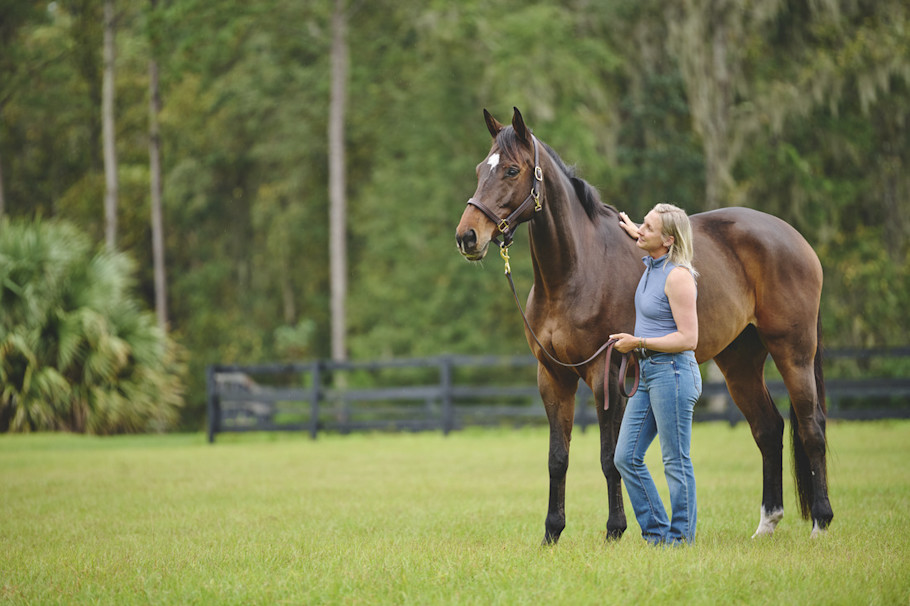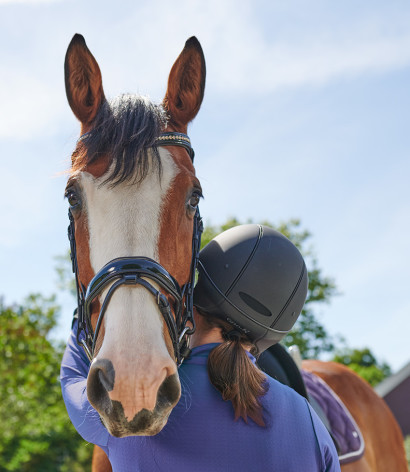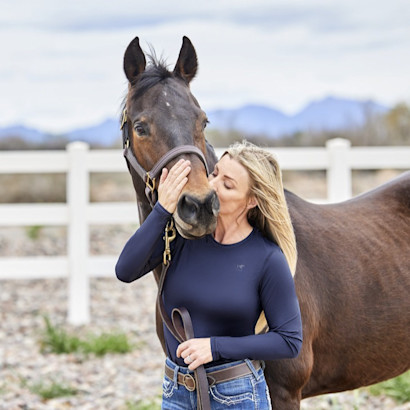When the Time Comes to Say Goodbye - Putting a Horse Down
What owners need to know when considering euthanasia for their horse.
Updated May 9, 2024 | By: Carolyn Hammer, DVM, PhD

As horse owners, we share a profound bond with our equine companions. However, part of responsible ownership involves understanding and preparing for difficult decisions, including euthanasia.
The term euthanasia derives from the Greek word euthanatos meaning “good death.” It is the act of intentionally ending an animal’s life in a humane way. Horse owners also use the phrases “putting a horse down” or “putting a horse to sleep.” However, veterinarians try to steer owners away from using the terminology “putting a horse to sleep,” as it can cause confusion, especially for children, as this “sleep” is not one the horse will wake up from. Euthanasia is a final and irreversible sleep.
While this is not always an easy (or pleasant) topic to discuss, it is our goal to provide you with insights into the euthanasia process, emphasizing the importance of informed decision-making and compassionate end-of-life care for your equine partner.
Knowing When it’s Time to Put a Horse Down

When it comes to saying goodbye, it's often said that it’s better to make the decision a week early than a day late. Almost every veterinarian can recall stories of being called out in the cold, rain, or snow to euthanize an older horse that had become so weak it was now unable to get up. The horse may have spent hours, wet and shivering, waiting for the veterinarian to arrive.
While sometimes emergency trauma results in similar situations and cannot be avoided, many times it is a senior or chronically ill horse that has spent hours or days getting to this point. As loving caretakers, allowing our horse’s last day to be the best day possible is one of the most humane gifts we can provide.
Reasons Why Horses are Euthanized
Deciding to euthanize a horse involves careful consideration of various factors such as quality of life, prognosis, financial constraints, and emotional readiness. Contrary to common belief, euthanasia isn't reserved solely for senior horses. Illness, injury, chronic pain, or severe behavioral issues can necessitate this decision regardless of age. The American Association of Equine Practitioners (AAEP) lists the following scenarios as ones that may result in euthanasia:
- Incurable, progressive or transmissible disease
- Chronic, severe lameness
- Inoperable colic
- Foals born with serious defects
- Debilitation in old age
- Severe traumatic injury
- Dangerous behavioral traits (dangerous to the horse or others)
- Undue financial burden of caring for a sick or incapacitated horse
- Undue suffering for any reason
Each situation is unique. Even with similar situations, the decision to euthanize a horse is highly individual. While each of us must make the decision based on our own values and experiences, your veterinarian can assist in making this determination, especially regarding the degree to which your horse is suffering and the most humane course of action.
It is important to note that while your veterinarian can provide medical information, explain options, and offer support, they cannot make the final decision for you.
Having a Plan in Place

Having a clear plan in place helps make a difficult time more manageable. This plan should include:
- Identifying criteria for euthanasia based on the horse's well-being and prognosis.
- Researching and understanding available euthanasia methods.
- Making arrangements for your horse’s remains.
Criteria
As mentioned previously, every situation is unique and there is a wide range of circumstances where euthanasia is a humane and responsible choice. To assist horse owners in making euthanasia decisions, the AAEP has published the following guidelines:
- A horse should not have to endure continuous or unmanageable pain from a condition that is chronic and incurable.
- A horse should not have to endure a medical or surgical condition that has a hopeless chance of survival.
- A horse should not have to remain alive if it has an unmanageable medical condition that renders it a hazard to itself or its handlers.
- A horse should not have to receive continuous analgesic medication for the relief of pain for the rest of its life.
- A horse should not have to endure a lifetime of continuous individual box stall confinement for prevention or relief of unmanageable pain or suffering.
Be sure to share your plan and thoughts with other key members of your horse’s care team regarding the criteria and situations in which you would choose euthanasia. Have a conversation with your veterinarian as well as your family, barn manager, or others who may be caring for your horse if you are away. Having these talks and making your plan known can help prevent your horse from prolonged suffering if a traumatic injury or severe illness occurs and you are unable to be contacted.
Methods
Euthanasia should only be performed by a properly trained individual using one of the acceptable methods.
The American Veterinary Medical Association (AMVA) and the AAEP provide a list of the acceptable methods for euthanasia. Intravenous barbiturates, gunshot, or penetrating captive bolt to the appropriate area on the head are a few of the acceptable methods listed. Prior sedation should be considered when possible, and each method must be carried out using specific techniques that the AVMA and AAEP outline.
The choice of euthanasia method can depend on several factors such as state and local laws and regulations, your veterinarian’s experience, safety for handlers, and the condition and welfare of the horse. For instance, intravenous barbiturates may not be the right choice if there is potential for wildlife to gain access to the body.
It's essential to discuss these options with your veterinarian to choose the most appropriate method for your horse's situation.
Making Arrangements for Your Horse’s Remains
Cost, practicality, and availability of methods for taking care of your horse’s body vary greatly based on your location. As an owner, you should become familiar with options and regulations in your specific location. Below are some commonly available choices.
Burial
If you have a large amount of land, burial may be an option. Regulations on animal burial vary widely from state to state (and even location to location within a state). The depth of the burial site and its proximity to water sources are often regulated. Due to the size of an average horse, access to large equipment (such as a tractor and backhoe) is typically required to dig a deep and large enough area.
Cost is minimal if you already have the large farm equipment but can be moderately expensive if equipment needs to be rented ($250+).
Cremation
Some locations offer owners the option of cremation. Individual cremation may be more expensive than other options, but it allows owners to retain their horse’s ashes. Communal cremation is typically less expensive but would not provide ashes specific to an individual horse. Costs typically start around $600 and can exceed $2,000.
Composting
This refers to the breakdown of your horse’s remains through microbes. Composting piles must be managed appropriately for the process to occur correctly and can take roughly 6-10 months to break down an intact horse carcass. If you have the space at your farm, and potentially a permit (depending on regulations in your area), composting can be a relatively low cost.
Donation
Many veterinary schools (and some farrier schools) have donation programs that will accept a horse’s remains. Donations allow students to learn anatomy and practice dissections and surgical techniques to better their education as future doctors. Your veterinarian may be able to help you find a donation program nearby.
Depending on how your horse was euthanized, donating their remains to a wildlife sanctuary may be an option. Their body could feed other animals, like big cats, if they meet certain criteria.
Landfill
Only some landfills will accept animal remains, and of those that do, not all will accept horses. Some will not accept horses euthanized with certain chemical agents. Landfill disposal is often one of the most affordable options for owners, and depending on the location and rate, disposal can be as low as $50.
Rendering
This is a common method for livestock carcass disposal, although not all states have rendering plants. Rendering companies pick up the remains and then use heat to convert animal tissues into end products utilized in other industries. Rendering companies charge a fee for pick up (~$75-$250) and may have policies against accepting horses euthanized with certain chemical agents.
The Final Day
On the day you’ve decided to put your horse down, your veterinarian should guide you through what will happen with care and compassion. If you wish to be present, either holding your horse or present nearby, discuss your preferences with your veterinarian in advance. Depending on the method used, the procedure and your horse’s response can be slightly different. Your veterinarian can help explain what to expect.
In general, as a horse loses consciousness, they will fall to the ground. The horse is not aware of what is happening and can fall abruptly. For safety reasons, you may not be able to hold your horse during the euthanasia procedure. However, once your veterinarian determines it is safe to approach, you will be able to touch and say your final farewell.
Grief and Remembering Your Heart Horse
Coping with the loss of a beloved horse can be challenging. We develop strong bonds with our equine partners and the loss can evoke profound feelings of grief. It's essential to allow yourself time to grieve. Seek support from friends, family, or professional counselors if needed.
Remembering your horse's life and the joy they brought you can provide solace during the grieving process. Consider creating a memorial from a lock of tail hair, saving their horseshoes, or participating in activities that honor their memory.
While we all hope our horses will live a long, happy life and pass away peacefully in their sleep, planning for other possibilities is a necessary aspect of horse ownership. By understanding the factors involved and having a plan in place, we can ensure a dignified and compassionate end-of-life journey when faced with the difficult decision of euthanasia.
Additional Horse Owner Resources
- Saying Goodbye to My Heart Horse by SmartPaker Riley
- Video on helping a horse cope with the loss of a pasture mate